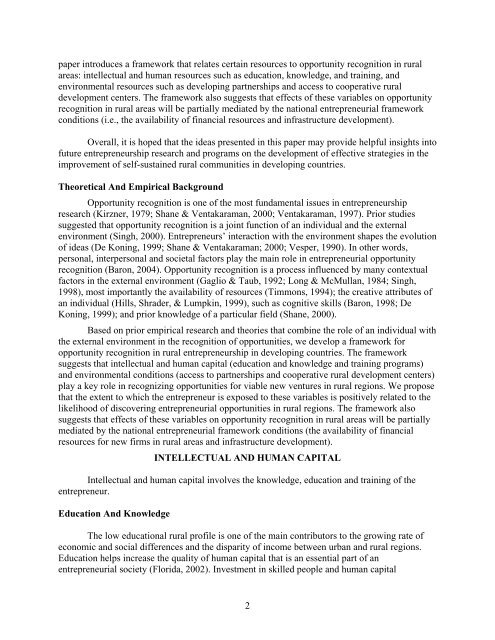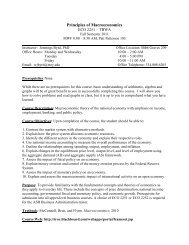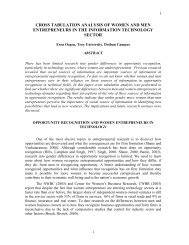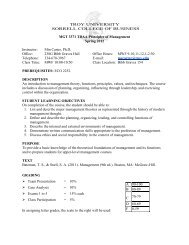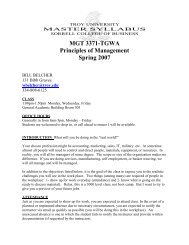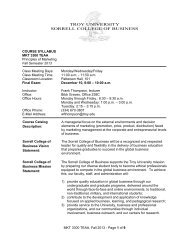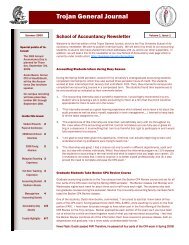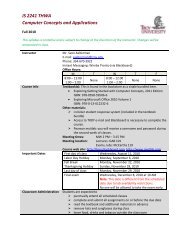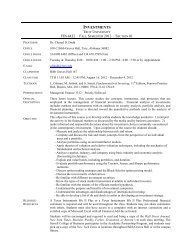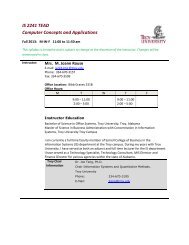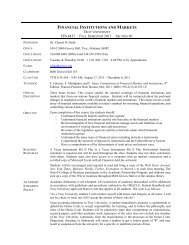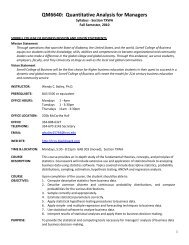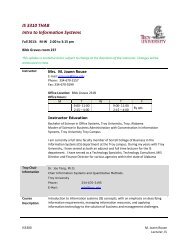a framework to support entrepreneurial development in rural
a framework to support entrepreneurial development in rural
a framework to support entrepreneurial development in rural
Create successful ePaper yourself
Turn your PDF publications into a flip-book with our unique Google optimized e-Paper software.
paper <strong>in</strong>troduces a <strong>framework</strong> that relates certa<strong>in</strong> resources <strong>to</strong> opportunity recognition <strong>in</strong> <strong>rural</strong>areas: <strong>in</strong>tellectual and human resources such as education, knowledge, and tra<strong>in</strong><strong>in</strong>g, andenvironmental resources such as develop<strong>in</strong>g partnerships and access <strong>to</strong> cooperative <strong>rural</strong><strong>development</strong> centers. The <strong>framework</strong> also suggests that effects of these variables on opportunityrecognition <strong>in</strong> <strong>rural</strong> areas will be partially mediated by the national <strong>entrepreneurial</strong> <strong>framework</strong>conditions (i.e., the availability of f<strong>in</strong>ancial resources and <strong>in</strong>frastructure <strong>development</strong>).Overall, it is hoped that the ideas presented <strong>in</strong> this paper may provide helpful <strong>in</strong>sights <strong>in</strong><strong>to</strong>future entrepreneurship research and programs on the <strong>development</strong> of effective strategies <strong>in</strong> theimprovement of self-susta<strong>in</strong>ed <strong>rural</strong> communities <strong>in</strong> develop<strong>in</strong>g countries.Theoretical And Empirical BackgroundOpportunity recognition is one of the most fundamental issues <strong>in</strong> entrepreneurshipresearch (Kirzner, 1979; Shane & Ventakaraman, 2000; Ventakaraman, 1997). Prior studiessuggested that opportunity recognition is a jo<strong>in</strong>t function of an <strong>in</strong>dividual and the externalenvironment (S<strong>in</strong>gh, 2000). Entrepreneurs’ <strong>in</strong>teraction with the environment shapes the evolutionof ideas (De Kon<strong>in</strong>g, 1999; Shane & Ventakaraman; 2000; Vesper, 1990). In other words,personal, <strong>in</strong>terpersonal and societal fac<strong>to</strong>rs play the ma<strong>in</strong> role <strong>in</strong> <strong>entrepreneurial</strong> opportunityrecognition (Baron, 2004). Opportunity recognition is a process <strong>in</strong>fluenced by many contextualfac<strong>to</strong>rs <strong>in</strong> the external environment (Gaglio & Taub, 1992; Long & McMullan, 1984; S<strong>in</strong>gh,1998), most importantly the availability of resources (Timmons, 1994); the creative attributes ofan <strong>in</strong>dividual (Hills, Shrader, & Lumpk<strong>in</strong>, 1999), such as cognitive skills (Baron, 1998; DeKon<strong>in</strong>g, 1999); and prior knowledge of a particular field (Shane, 2000).Based on prior empirical research and theories that comb<strong>in</strong>e the role of an <strong>in</strong>dividual withthe external environment <strong>in</strong> the recognition of opportunities, we develop a <strong>framework</strong> foropportunity recognition <strong>in</strong> <strong>rural</strong> entrepreneurship <strong>in</strong> develop<strong>in</strong>g countries. The <strong>framework</strong>suggests that <strong>in</strong>tellectual and human capital (education and knowledge and tra<strong>in</strong><strong>in</strong>g programs)and environmental conditions (access <strong>to</strong> partnerships and cooperative <strong>rural</strong> <strong>development</strong> centers)play a key role <strong>in</strong> recogniz<strong>in</strong>g opportunities for viable new ventures <strong>in</strong> <strong>rural</strong> regions. We proposethat the extent <strong>to</strong> which the entrepreneur is exposed <strong>to</strong> these variables is positively related <strong>to</strong> thelikelihood of discover<strong>in</strong>g <strong>entrepreneurial</strong> opportunities <strong>in</strong> <strong>rural</strong> regions. The <strong>framework</strong> alsosuggests that effects of these variables on opportunity recognition <strong>in</strong> <strong>rural</strong> areas will be partiallymediated by the national <strong>entrepreneurial</strong> <strong>framework</strong> conditions (the availability of f<strong>in</strong>ancialresources for new firms <strong>in</strong> <strong>rural</strong> areas and <strong>in</strong>frastructure <strong>development</strong>).INTELLECTUAL AND HUMAN CAPITALIntellectual and human capital <strong>in</strong>volves the knowledge, education and tra<strong>in</strong><strong>in</strong>g of theentrepreneur.Education And KnowledgeThe low educational <strong>rural</strong> profile is one of the ma<strong>in</strong> contribu<strong>to</strong>rs <strong>to</strong> the grow<strong>in</strong>g rate ofeconomic and social differences and the disparity of <strong>in</strong>come between urban and <strong>rural</strong> regions.Education helps <strong>in</strong>crease the quality of human capital that is an essential part of an<strong>entrepreneurial</strong> society (Florida, 2002). Investment <strong>in</strong> skilled people and human capital2


